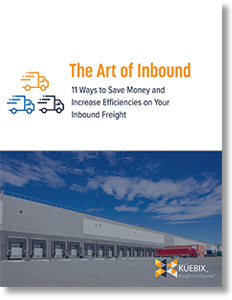Many shippers have identified opportunities in their supply chains that could be improved by leveraging technology.
Without a thorough understanding of what a TMS (Transportation Management System) is, however, they are at a disadvantage in their continuous improvement journey.
It’s important to get an overview of what a TMS’s basic functionalities are before diving into a TMS’s specific money and time-saving features.
So, what is a TMS?
Simply put, a TMS is a tool that helps supply chain professionals manage their freight and carriers.
The core functionality of a TMS includes helping the user find the best mode and rate for any type of shipment to ensure they are getting the best deal.
Rating, booking, and tracking are considered core features for any modern TMS.
The software should also allow the user to retain full control of their logistics by helping them automate order entry, create shipments, optimize shipments and routes, manage carriers, schedule pickups, and deliveries, manage the yard, and communicate effectively with all supply chain stakeholders.
Many transportation management systems also provide insights into a business’s efficiency through detailed analytics.
What are the Benefits of a TMS?
- Bottom Line Results – A TMS should ensure that each shipment is being booked with the optimal combination of rate and service type. These savings can be significant but should never be eaten up by long implementation times. The best way to avoid this is by implementing a cloud-based TMS which can be up and running within minutes.
- Time Savings – Instead of sending disjointed emails or endlessly sitting on hold, shippers can instantly access the information they need via a single digital platform. Technology gives shippers the power to compare rates side by side and know that they are always making strategic choices regarding their freight.
- Improved Customer Service – Technology helps keep the supply chain running smoothly, increasing on-time deliveries and making tracking and tracing information accessible. By leveraging a TMS’s predictive analytics, shippers can inform their customers of shipment changes such as late or missed deliveries.
- Business Growth – As a company continues to leverage a TMS, their improved efficiencies often result in business growth. A good TMS should be able to seamlessly scale to meet the needs of small businesses and enterprise-level companies alike. This keeps the company competitive without uprooting their logistics operations to add new capabilities.
Kuebix TMS is designed to offer these competitive advantages to any size company looking to streamline their supply chain through technology.
Shippers can sign up risk-free for Kuebix Free Shipper, the TMS for transportation and logistics professionals looking to rate, book and track an unlimited number of LTL, TL and Parcel shipments from a single platform.
Since Kuebix TMS scales to meet the needs of any size organization with the addition of modular features and managed services, growing companies and enterprise level organizations can take advantage of technology to improve their supply chains.
By leveraging the power of a TMS, any shipper can easily take action on the supply chain opportunities they have identified and manage their freight and carriers more effectively.
Related: How to Go About Buying a Transportation Management System
Related White Papers & eBooks
The Art of the Inbound: 11 Ways to Improve Your Inbound Shipping Operations New!
This ebook provides a guide to benchmark your company against best practices in the transportation and shipping industry and helps to put together a strategic approach to capitalizing on the opportunities to manage the “art of the inbound.” Download Now!
The Complete Buyer’s Guide to Transportation Management Systems
There is almost no limit to how a Transportation Management System can benefit your unique supply chain, but the key to success is finding the right one for your goals, so, before selecting a TMS, use the 12 questions in this buyer’s guide to find the best solution for your company. Download Now!
Effectively Managing Big Data in Your Supply Chain
In this white paper, we’ll explain what the term “big data” means to the typical supply chain, introduce effective strategies for managing and leveraging that data, show how one grocer is using predictive analytics to harness its own big data, and explain the “first steps” that companies need to take down the path to effective management of their big data. Download Now!
More Resources from Kuebix
Article topics
Email Sign Up





















